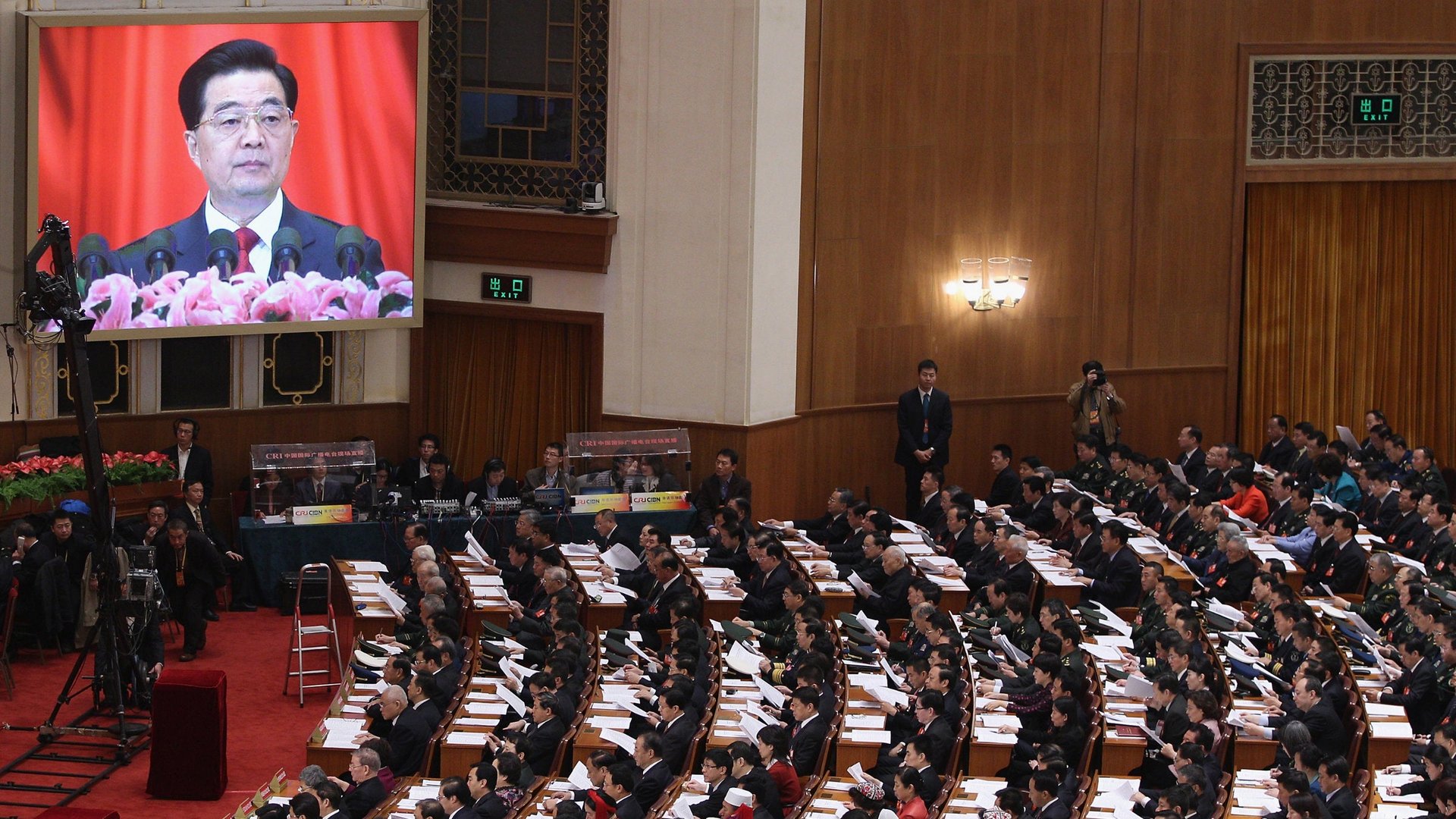100 minutes of lip service: Outgoing China president lambasts the corruption he presided over
China’s political transition is in full swing in Beijing, replete with lengthy speeches and obligatory internet crackdowns. Outgoing President Hu Jintao’s lengthy reading of the most pressing issues facing the party—in oratory second only to Castro’s multi-hour monologues (minus the Cuban’s fiery delivery)—went on for a good 100 minutes. He made an ominous warning over corruption spoiling the party and threatening the state. By western media accounts you’d think China was finally getting serious about graft in the world’s second largest economy. That this was considered news in the US says more about the inability to separate propaganda from policy than it does about any new crackdown in China.


China’s political transition is in full swing in Beijing, replete with lengthy speeches and obligatory internet crackdowns. Outgoing President Hu Jintao’s lengthy reading of the most pressing issues facing the party—in oratory second only to Castro’s multi-hour monologues (minus the Cuban’s fiery delivery)—went on for a good 100 minutes. He made an ominous warning over corruption spoiling the party and threatening the state. By western media accounts you’d think China was finally getting serious about graft in the world’s second largest economy. That this was considered news in the US says more about the inability to separate propaganda from policy than it does about any new crackdown in China.
From the official Xinhua translation:
Combating corruption and promoting political integrity, which is a major political issue of great concern to the people, is a clear-cut and long-term political commitment of the Party. If we fail to handle this issue well, it could prove fatal to the Party, and even cause the collapse of the Party and the fall of the state.
Hu went on to say that officials “should both exercise strict self-discipline and strengthen education and supervision over their families and their staff; and they should never seek any privilege.”
That must have rung hollow considering the massive family wealth accumulated by Premier Wen and heir-apparent Xi Jinping’s families over the years.
According to state-controlled CCTV:
There are over 660,000 officials who have been punished for disciplinary violations in the past five years since the 17th CPC National Congress held in 2007—that’s according to the Communist Party of China’s anti-corruption bodies…And more than 60 officials among them are at ministerial and provincial levels.
Chinese citizens, at least privately or through online discussion forums like Weibo, read through the tea leaves quite easily, despite anti-corruption rhetoric routinely mentioned in past CPC presidential speeches. Because of the highly publicized downfall of Bo Xilai and his wife this year, the outgoing president likely made a more forceful statement. But the record of the last 10 years hardly shows improvement while he held the reigns of power.
According to Transparency International’s Perception of Corruption Index, the China of 2011, with a score of 3.6, was virtually unchanged from China a decade earlier with a 2002 score of 3.5 (the closer to zero the higher the perception of corruption). The World Bank’s “Worldwide Governance Indicators” painted a far bleaker picture. China’s control of corruption actually worsened in the last decade dropping from 33.7 to 28.9 (a lower number indicates worse corruption).
What could President Hu have done during his 10-year tenure? Two major policy changes would have significantly improved the fight against corruption and could still avoid a calamitous “fall of the state” as Hu warned. Empowering a truly independent and transparent judiciary, separate from party influence, to fight corruption would have gone a long way towards de-politicizing the issue. Until that happens, corruption will remain the domain of party and factional infighting that uses the courts to carry out its purges.
Signing on to and enforcing international anti-corruption treaties would also be a sign of real change. Increasingly, corruption spans national boundaries. Cooperation among countries remains essential to root out these destabilizing influences especially when countering corrupt business practices overseas.
Since Hu is the outgoing president his words weigh lightly on the new administration unless he can keep his influence alive from behind the scenes. Former President Jiang Zemin’s appearance at the 18th CPC suggests he still has competition in that regard.
In the end, Hu may be right. Corruption remains one of the most pressing problems for continued party legitimacy, especially if the economy continues to slow and opportunity for the middle class shrinks. That middle increasingly takes to the streets to vent its frustration.